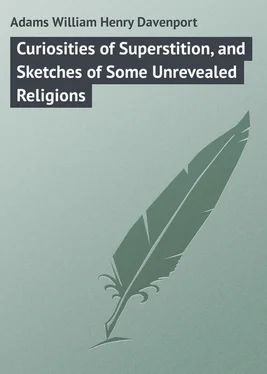William Adams - Curiosities of Superstition, and Sketches of Some Unrevealed Religions
Здесь есть возможность читать онлайн «William Adams - Curiosities of Superstition, and Sketches of Some Unrevealed Religions» — ознакомительный отрывок электронной книги совершенно бесплатно, а после прочтения отрывка купить полную версию. В некоторых случаях можно слушать аудио, скачать через торрент в формате fb2 и присутствует краткое содержание. Жанр: foreign_language, foreign_prose, на английском языке. Описание произведения, (предисловие) а так же отзывы посетителей доступны на портале библиотеки ЛибКат.
- Название:Curiosities of Superstition, and Sketches of Some Unrevealed Religions
- Автор:
- Жанр:
- Год:неизвестен
- ISBN:нет данных
- Рейтинг книги:4 / 5. Голосов: 1
-
Избранное:Добавить в избранное
- Отзывы:
-
Ваша оценка:
- 80
- 1
- 2
- 3
- 4
- 5
Curiosities of Superstition, and Sketches of Some Unrevealed Religions: краткое содержание, описание и аннотация
Предлагаем к чтению аннотацию, описание, краткое содержание или предисловие (зависит от того, что написал сам автор книги «Curiosities of Superstition, and Sketches of Some Unrevealed Religions»). Если вы не нашли необходимую информацию о книге — напишите в комментариях, мы постараемся отыскать её.
Curiosities of Superstition, and Sketches of Some Unrevealed Religions — читать онлайн ознакомительный отрывок
Ниже представлен текст книги, разбитый по страницам. Система сохранения места последней прочитанной страницы, позволяет с удобством читать онлайн бесплатно книгу «Curiosities of Superstition, and Sketches of Some Unrevealed Religions», без необходимости каждый раз заново искать на чём Вы остановились. Поставьте закладку, и сможете в любой момент перейти на страницу, на которой закончили чтение.
Интервал:
Закладка:
After having made these adieux, he was silent, and engaged in meditation; then with his dying tongue he faltered forth his bitter regret that he did not enjoy more of the “world of the eyes” (the faculty of seeing), of the “world of the thought” (the faculty of thinking), of “the world of the knowledge which springs from observation” (the knowledge of sensible objects); of the “world of the knowledge which springs from the mind” — l’esprit (the perception of spiritual things); and that he did not possess the fulness of the Intelligence. Finally, he pronounced two gubhas , which he caused to be repeated to the persons near him: —
“Adoration to Maitrêya Tathagata , gifted with a sublime intelligence! I desire, with all men, to see your affectionate visage.
“Adoration to Maitrêya Tathagata ! I desire, when I quit this life, to be born again in the midst of the multitude who surround you.”
The Master of the Law, after having long fixed his gaze upon Te-hoeï, the sub-director of the convent ( Karmmadana ), raised his right hand to his chin and his left upon his breast; then he stretched out his legs, crossed them, and lay down on the right side.
He remained thus, immovable, without taking anything, until the fifth day of the second moon. In the middle of the night his disciples asked him:
“Master, have you at length obtained to be born in the midst of the assembly of Maitrêya ?”
“Yes,” he replied, with a failing voice. And having spoken, his breathing grew rapidly weaker, and in a few moments, his soul passed away.
His servants, feeling quietly, found that his feet were already cold, but that the back part of the head retained its warmth.
On the seventh day (of the second moon) his countenance had not undergone any alteration, and his body exhaled no odour.
The religious of the convent having passed several days in prayers, it was not until the morning of the ninth day that the sad news reached the capital.
The Master of the Law was seven tchi high; his face was of a fresh complexion. His eyebrows were wide apart, his eyes brilliant. His air was grave and majestic, and his features were full of grace and vivacity. The quality or tone ( timbre ) of his voice was pure and penetrating, and his language at times soared to a lofty eloquence, so noble and so harmonious that one could not refuse to listen. When he was surrounded by his disciples, or animated by the presence of an illustrious guest, he would often speak for half-a-day, while his hearers sat riveted in an immovable attitude. His favourite attire was a robe of fine cotton stuff, proportioned to his height and figure; his gait was light and easy; he looked straight before him, throwing his glances neither to the right nor to the left. He was majestic as those great rivers which embrace the earth; calm and shining as the lotus which springs in the midst of the waters. A severe observer of discipline, he was unchanged and unchangeable. Nothing could equal his affectionate benevolence and tender pity, the fervour of his zeal or his inviolable attachment to the practices of the Law. He was reserved in his friendship, made no hasty bonds, and when once he had entered his convent, nothing but an imperial decree could have drawn him from his pious retreat.
On the third day of the second moon (of the period Lin-te , – 664), the Master of the Law had sent Hiu-hiouen-pi to inform the Emperor of the wound he had received, and of the malady it had induced.
On the seventh day of the same month the Emperor, by a decree, ordered one of the imperial physicians to take with him medicaments and attend upon the Master of the Law, but by the time he arrived, the Master was already dead. Teou-sse-lun, governor of Fang-tcheou, announced by a report this melancholy event.
At the news, the Emperor shed tears copiously, and cried aloud in his sorrow, declaring that he had just lost the treasure of the empire. For several days he suspended the usual audiences.
All the civil and military functionaries abandoned themselves to groans and tears: the Emperor himself was unable to repress his sobs or moderate his grief. On the next day but one, he spoke to his great officers as follows:
“What a misfortune for my empire is the loss of Thsang, the Master of the Law! It may well be said that the great family of Cakya has seen its sole support shattered beneath it, and that all men remain without master and without guide. Do they not resemble the mariner who sees himself sinking into the abyss, when the storm has destroyed his oars and his shallop? the traveller astray in the midst of the darkness, whose lamp dies out at the entrance to a bottomless gulf?”
When he had uttered these words, the Emperor groaned again, and sighed many times.
On the twenty-sixth day of the same month, the Emperor issued the following decree:
“In accordance with a report addressed to me by Teou-sse-lun on the death of the Master of the Law, Hiouen-thsang, of the convent Yu-hoa-sse , I order that his funeral take place at the expense of the State.”
On the sixth day of the third moon, he issued a new decree as follows:
“By the death of Thsang, the Master of the Law, the translation of the sacred books is stopped. In conformity to the ancient ordinances, the magistrates will cause the translations already completed to be copied carefully: as for the (Indian) manuscripts which have not yet been translated, they will be handed over in their entirety to the director of the convent Ts’e’-en-sse (of the Great Beneficence,) who will watch over their safety. The disciples of Hiouen-thsang and the translators’ company, who previously did not belong to the convent Yu-hoa-sse , will all return to their respective convents.”
On the fifth day of the third moon appeared the following decree:
“On the day of the funeral of the Master of the Law, Hiouen-thsang, I permit the male and female religious of the capital to accompany him with banners and parasols to his last resting-place. The Master of the Law shone by his noble conduct and his eminent virtues, and was the idol of his age. Wherefore, now he is no more, it is just that I should diffuse again abundant benefits to honour the memory of a man who has had no equal in past times.”
His disciples, faithful to his last wishes, formed a litter of coarse mats, removed his body to the capital, and deposited it in the convent of the Great Beneficence, in the middle of the hall devoted to the labours of translation. United by the sentiment of a common sorrow, they uttered such cries as might have shaken the earth. The religious and the laics of the capital hastened to the spot, and poured out tears mingled with sobs and cries. Every day the crowd was swollen by fresh arrivals.
On the fourteenth day of the fourth month, preparations were made for his interment in the capital of the West. The male and female religious, and a multitude of the men of the people, prepared upwards of five hundred objects necessary for the celebration of his obsequies; parasols of smooth ( unia ) silk, banners and standards, the tent and the litter of the Ni-ouan (Nirvâna;) the inner coffin of gold, the outer one of silver, the so-lo trees ( salas ,) and disposed them in the middle of the streets to be traversed by the procession. The plaintive cadences of the funereal music, and the mournful dirges of the bearers resounded even to Heaven. The inhabitants of the capital and of the districts situated within a radius of five hundred li (fifty leagues,) who formed the procession, exceeded one million in number. Though the obsequies were celebrated with pomp, the coffin of the Master nevertheless was borne upon a litter composed of rude coarse mats. The silk manufacturers of the East had employed three thousand pieces of different colours in making the chariot of the Nirvâna, which they had ornamented with flowers and garlands, loaded with precious stones. They had asked permission to place the body of the Master of the Law upon this resplendent catafalque; but afraid of infringing his dying command, his disciples had refused. So it went first, bearing the Master’s three robes and his religious mantle, of the value of one hundred ounces of silver; next came the litter constructed of coarse mats. Not one of the assistants but shed copious tears or was almost choked with grief!
Читать дальшеИнтервал:
Закладка:
Похожие книги на «Curiosities of Superstition, and Sketches of Some Unrevealed Religions»
Представляем Вашему вниманию похожие книги на «Curiosities of Superstition, and Sketches of Some Unrevealed Religions» списком для выбора. Мы отобрали схожую по названию и смыслу литературу в надежде предоставить читателям больше вариантов отыскать новые, интересные, ещё непрочитанные произведения.
Обсуждение, отзывы о книге «Curiosities of Superstition, and Sketches of Some Unrevealed Religions» и просто собственные мнения читателей. Оставьте ваши комментарии, напишите, что Вы думаете о произведении, его смысле или главных героях. Укажите что конкретно понравилось, а что нет, и почему Вы так считаете.












